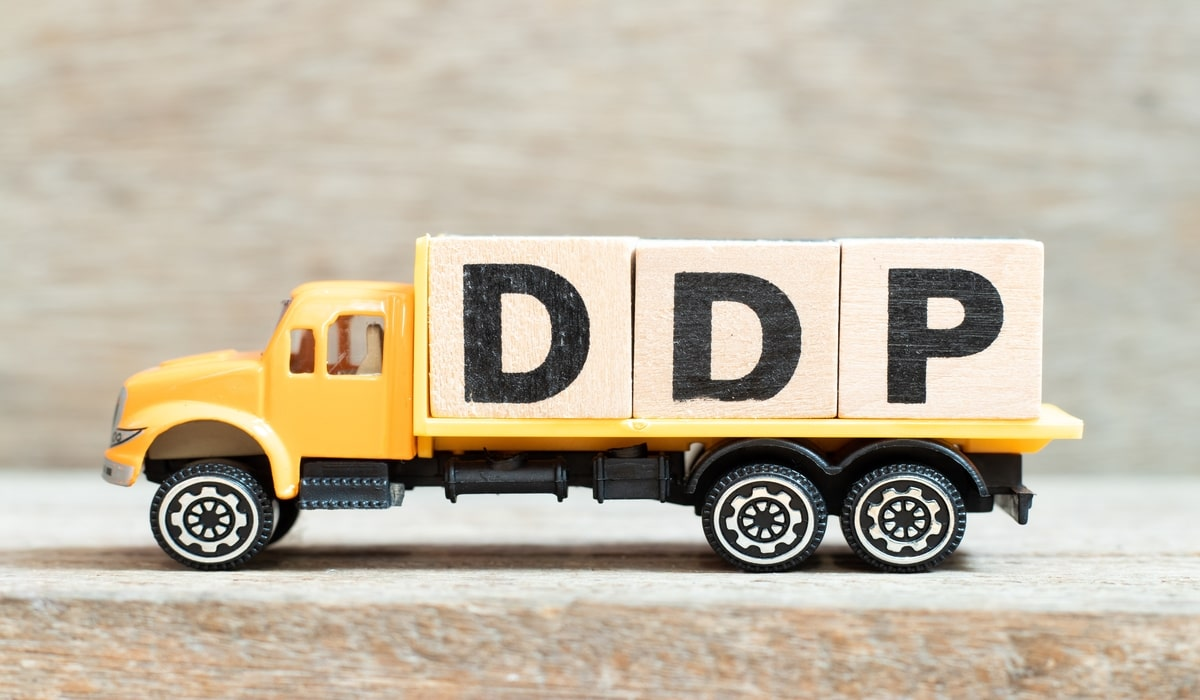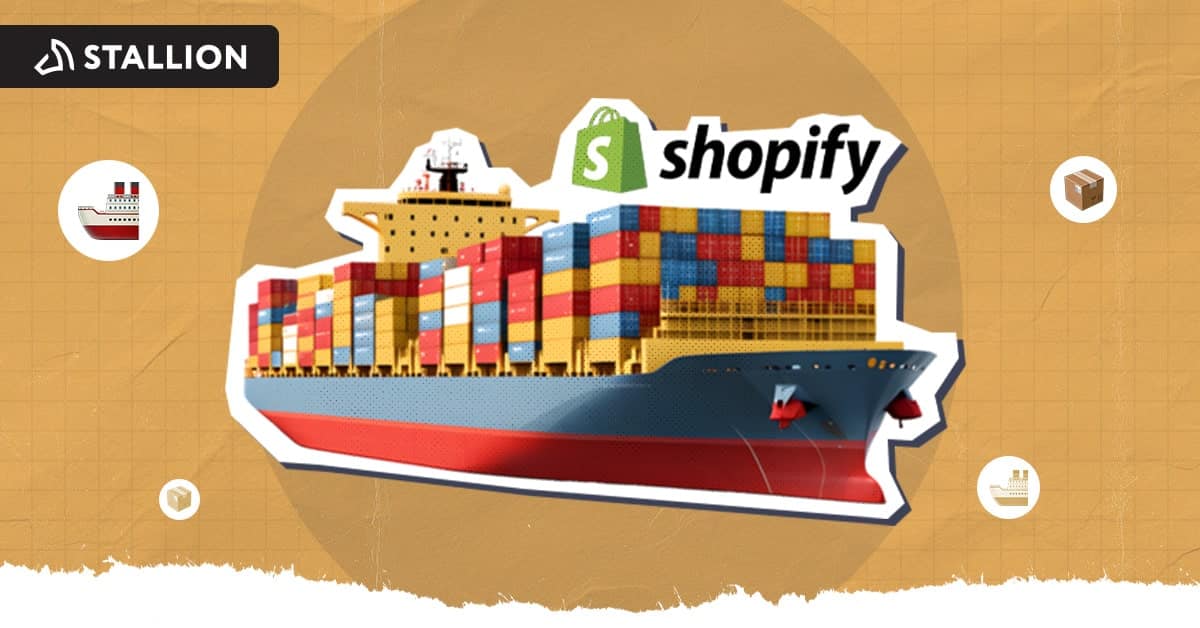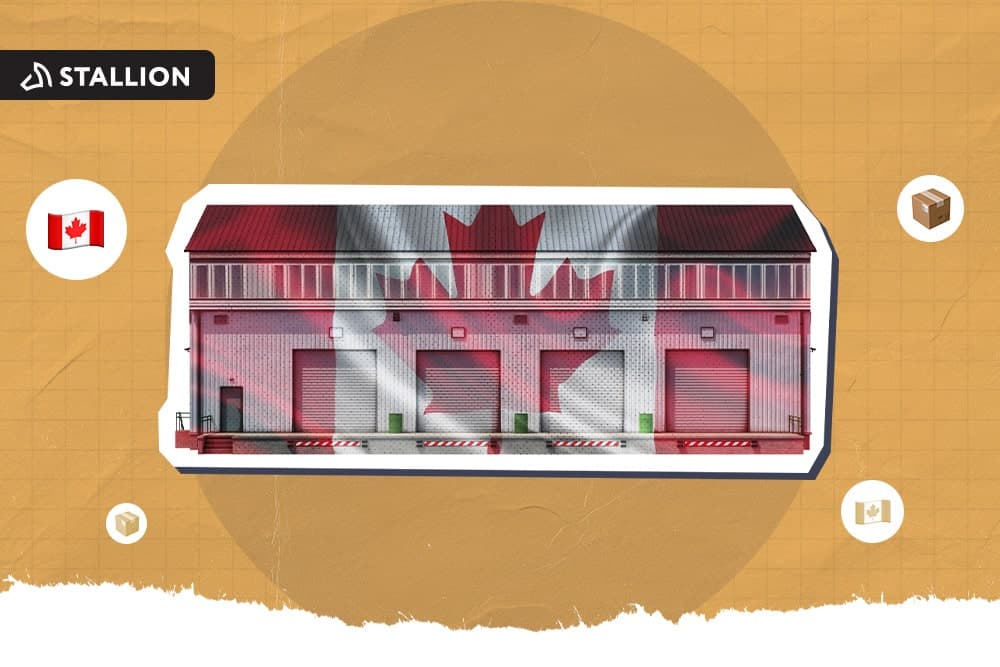
Shipping your products overseas or looking to expand internationally? In this comprehensive overview, we will discuss the intricacies of DDP service, a vital component of international trade, shedding light on its fundamental ideas and real-world applications.
This blog post will empower Canadian businesses with the knowledge needed to explore global commerce, optimize logistics, and make informed decisions about their international business operations.
Delivered Duty Paid or DDP shipping is when the seller assumes all shipping costs and risks until the items arrive at the location agreed upon by the buyer and seller. This includes import duties, taxes, and customs clearance fees.
This process ensures the buyer receives the goods without additional financial or logistics issues.
The location, on the other hand, is typically within the premises of the buyer or a customs-cleared location in the importing country. It provides buyers with a hassle-free and fully inclusive purchasing experience.
While there are no different "types" of DDP services per se, the specific arrangements and details of DDP shipments can vary based on factors such as the nature of the goods, the trade agreement between the buyer and seller, and the shipping providers involved.
Here are some variations and considerations within DDP shipment:
The seller and buyer have specific responsibilities under the Delivered Duty Paid (DDP) shipping arrangement, which are outlined below:
Delivered Duty Paid as an Incoterm in international trade has its own advantages and disadvantages for both sellers and buyers. Here's an overview of the pros and cons:

It offers a hassle-free purchasing experience for buyers because the seller takes care of most of the logistics, including customs clearance and import duties, which can be particularly advantageous for inexperienced or risk-averse buyers.
Buyers have clarity about the package's total amount, including import formalities, duties, taxes, and shipping costs, upfront, helping with budgeting and financial planning.
Buyers bear less risk since the seller is responsible for the items until they are delivered to the specified location, reducing the risk of damage or loss during transit.
It can make it easier for sellers to access global markets and reach customers wanting a simplified import process.
Offering DDP shipping can help businesses stand out from the competition in the international markets, as it can attract buyers seeking convenience and reduced paperwork.

The seller incurs higher costs when using DDP because they are responsible for paying customs duties, transportation costs, and customs clearance in the buyer's country, which can reduce profit margins.
Managing customs clearance and import regulations in the buyer's country can be complex and time-consuming, especially if the seller is unfamiliar with local laws.
Buyers may have limited control over the logistics process, which can be a disadvantage if they have specific requirements or timelines.
Depending on the destination, local infrastructure, or accessibility issues, the actual item delivery can impose challenges, leading to delays or complications affecting sellers and buyers at the same time.
Since DDP shipping is a suitable choice in international trade under certain circumstances, it's essential to consider your business's specific needs and goals and the characteristics of your products. Here are situations when you should consider using this incoterm:
High Convenience for the Buyer. This is the perfect option to offer your buyers the highest level of convenience. It minimizes their involvement in customs processes, so customers who appreciate simplicity and ease of receiving packages may find this an appealing alternative.
Complex Customs Process. It is the best option when navigating the customs processes in the destination country, which will take a lot of time, effort, and knowledge. This is relevant when dealing with countries with intricate import restrictions.
Competitive Advantage. Suppose your competitors primarily offer other incoterms, and you want to stand out in the market. In that case, providing DDP shipping can give you a boost, especially if your target audience prefers a hassle-free import experience.
Buyer's Request. You can use DDP when your buyers specifically request this Incoterm. Some buyers may prefer DDP for predictability in shipping costs and simplicity in receiving goods.
Global Expansion. If you have plans to expand into new international markets, DDP can facilitate entry by making it easier for customers in those regions to purchase products.
High-Value Goods. DDP can be suitable for high-value items where the buyer may be concerned about potential risks during transit. The seller's responsibility for safe delivery provides customers with a sense of security and confidence.
Strong Relationship with Buyers. If you have a solid and trusting relationship with your buyers, DDP can be a way to enhance that relationship by providing a worry-free customer experience.
Legal or Regulatory Requirements. In some cases, local regulations or contracts may require DDP or a similar Incoterm, so always ensure compliance with relevant laws.

Amazon does not officially offer DDP. Instead, Amazon uses various shipping and delivery methods, relying on fulfillment centers, third-party sellers, and logistics partners to handle the delivery to customers.
Additionally, Amazon provides different options, including international shipping, to customers and sellers. If you are an Amazon seller and you want to ship products internationally using a Delivered Duty Paid approach, you would need to arrange for DDP shipping through your chosen service provider.

In international trade, selecting the right Incoterm is critical. Let's explore the difference between DDP vs. other Incoterms. Understanding these distinctions is essential for successful global trade operations.
Under DDP, the seller takes full responsibility for completing the shipping process and clearing customs, removing the burden from the buyer. Meanwhile, EXW (Ex Works) is the complete opposite. It places minimal responsibilities on the seller, as they only prepare the goods at their location.
The buyer oversees all aspects of shipping goods, including expenses, risk, and handling the import process for inbound shipments. EXW is advantageous for sellers as it minimizes their obligations and costs.
FOB (Free On Board) is quite similar to EXW regarding accountability. The buyer is responsible for all subsequent transportation and insurance. The buyer will also clear customs and pay for the customs duties. The FOB is also commonly used in sea freight, and it offers more control and potential cost savings to the buyer but requires them to manage the shipping process.
In CIF (Cost, Insurance, and Freight), the seller and the buyer share accountability. It requires the seller to cover the transportation fees, insurance, and freight when shipping goods to a named destination port.
While the seller is responsible for insuring and shipping products, the risk transfers to the buyer once the goods are on board the vessel. The buyer is also responsible for paying duties, coordinating with customs authorities, and local transportation charges from the destination port to their location.
The buyer and seller also share responsibility for DDU (Delivered Duty Unpaid) shipping. While the seller is responsible for shipping the products to the agreed-upon location, the buyer handles the customs fees, taxes, and other customs processes in DDU shipping.
Shipping costs when using DDP can vary based on several factors. Here are some key factors that can influence shipping costs under DDP:
Transportation Costs. The cost of delivering goods from the seller's location to the buyer's specified destination is a significant part of the DDP fees. These costs vary based on distance, package weight and volume, transportation method, and shipping provider.
Duties and Taxes. One of the major expenses in DDP is the payment of import duties and taxes imposed by the customs authorities in the importing country. These fees are calculated based on the goods' value, type, classification, and applicable tariff rates.
Customs Fees. Brokerage, document processing, and inspection fees may apply in the receiving country. These fees can vary depending on the complexity of the process and local regulations.
Shipment Protection Cost. While insurance is not mandatory under DDP, the seller may purchase shipment protection during transit to protect against loss or additional damage fees. The cost of insurance, if provided, adds to the overall expenses.
Handling and Storage Fees. If there are delays in the process or if goods are held in storage at ports or warehouses, additional handling and storage fees may accrue.
Documentation and Administrative Costs. Preparing and processing the required documentation, including invoices, certificates of origin, and import permits, may involve administrative costs
Currency Conversion and Transaction Fees. When making payments in foreign currencies, currency conversion and transaction fees may be imposed by banks or financial institutions.
Miscellaneous Fees. Other miscellaneous fees, such as demurrage charges for exceeding agreed-upon timeframes at ports or additional fees for specialized processes, can arise.
Ensuring a smooth process with DDP requires careful planning, attention to detail, compliance with local regulations, and proactive steps. Begin by understanding import rules, preparing accurate documentation, and assigning Harmonized System (HS) codes.
If necessary, collaborate with a local customs broker and prepay the duties and taxes. Remember to provide clear and accurate descriptions and value declaration, follow marking and labelling requirements, and submit documents well in advance.
You'll also need to maintain open communication with customs authorities and monitor progress while staying informed about regulatory changes. Regularly review processes, and when in doubt, seek expert advice.
In conclusion, DDP Service is a comprehensive Incoterm that places the highest level of responsibility on the seller in international commerce. It offers convenience to the buyer by ensuring goods are delivered without hassle, but it requires meticulous preparation, compliance, and cost management on the part of the seller.

Choose Stallion as your trusted shipping partner. With a proven track record in the e-commerce shipping industry, we offer comprehensive logistics solutions tailored to your unique needs.
From seamless international shipping to efficient customs clearance, our experienced team ensures your goods reach their destination smoothly and on time. We prioritize reliability, affordability, and transparency, making your supply chain management hassle-free.
Whether you're a small online business or a large corporation, Stallion provides end-to-end services, including warehousing, transportation, and documentation. Let us handle the complexities of the global shipping process so you can focus on what matters most - growing your business.
Aman looks after the content marketing department at Stallion Express. He is passionate about helping businesses grow by providing informative and up-to-date trends in the eCommerce industry. Outside the office, you can find him on the soccer field cheering on Real Madrid.



Can our fellow Torontonians relate?
-
#smallbusiness #business #entrepreneur #socialmedia #shipping #ecommerce #canadianecommerce #shopify #poshmark #b2b #saas #etsy #ebay #canada #canadiansmallbusiness #shoplocalcanada #entrepreneur
#toronto

Here’s your quick hassle free shipping from 🇨🇦 to 🇺🇸 as a business owner!
-
Any questions?! Leave them 👇🏻 and save this video so you don’t forget!
-
#smallbusiness #business #entrepreneur #socialmedia #shipping #ecommerce #canadianecommerce #shopify #poshmark #b2b #saas #etsy #ebay #canada #canadiansmallbusiness #shoplocalcanada #entrepreneur

Meet @drinkbenny a 🇨🇦 female founded energy drink brand! Instead of focusing on their products, they’re taking a unique approach by hosting in person events in different Canadian cities to offer an experience for their community 🧡
-
What are your thoughts on in person events? 💭
-
#smallbusiness #business #entrepreneur #socialmedia #shipping #ecommerce #canadianecommerce #shopify #poshmark #b2b #saas #etsy #ebay #canada #canadiansmallbusiness #shoplocalcanada #entrepreneur

Do you know the difference between DDU and DDP when shipping internationally 🌏 ?
-
Questions? Leave them below! 👇🏻
-
#smallbusiness #business #entrepreneur #socialmedia #shipping #ecommerce #canadianecommerce #shopify #poshmark #b2b #saas #etsy #ebay #canada #canadiansmallbusiness #shoplocalcanada #entrepreneur

Here’s a quick hack to save time from choosing multiple postage options
↪️ Turn on the lowest postage rate automation to save you time!
-
Questions? Leave them below! 👇🏻
-
#smallbusiness #business #entrepreneur #socialmedia #shipping #ecommerce #canadianecommerce #shopify #poshmark #b2b #saas #etsy #ebay #canada #canadiansmallbusiness #shoplocalcanada #entrepreneur
